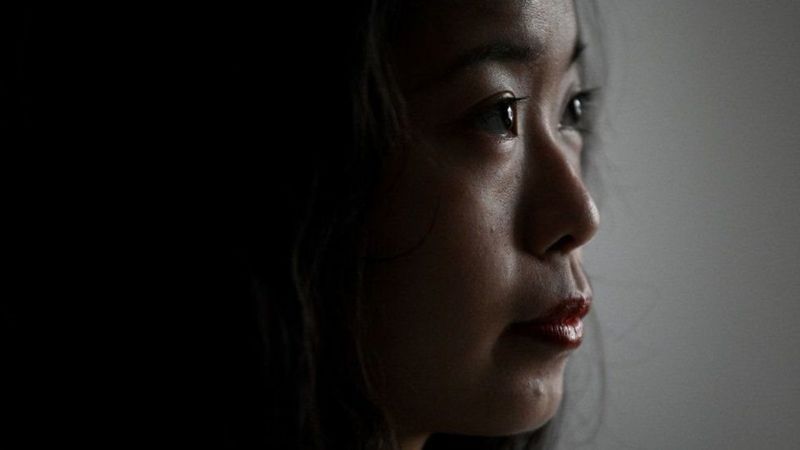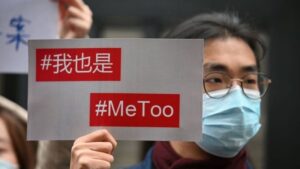
Gianzi looks tired. Speaking on the phone from Beijing, she tells the BBC, “Sorry, I’ve been crying for the last half an hour.”
It is the second day of a court ruling on a sexual assault allegation against one of China’s biggest stars.
The court dismissed Gianzi’s appeal, saying he did not have enough evidence to prove sexual assault.
It was this same case that made Jianzi the face of #MeToo, an online campaign against sexual harassment in China.
But now after three years, the court has turned down his appeal.

- ‘Trying to separate feminists from each other’
Before speaking to the BBC, Jianzi tried to contact a supporter on the Chinese social media platform Weibo, but was completely blocked on Weibo the day after the court verdict.
Jianzi’s supporter has also been blocked on Weibo. Reason- She was speaking openly in favor of Gianzi.
Gianzi got tears in her eyes to learn that she has now been turned away from her online supporters as well.
She says, “People’s accounts are being suspended constantly. There is no other way for me to contact them. I have also lost the opportunity to thank them.”
Jianzhi says that in the last three years only Chinese feminists have been separated from each other.

- Continuous repression of women who raise their voices
When the #MeToo campaign reached China in 2018, Jianzi was one of the many women who spoke about their sexual harassment in front of everyone.
His real name is Zhou Jiaojuan but he is popularly known as Jianzi.
In a 3,000-word article, Jianzi accused Xu Jun, host of the state-run news channel CCTV, of sexual harassment.
Gianzi’s article had gone viral. She told that when this incident happened, she was a 21-year-old intern and went to his dressing room hoping to get an interview with Xu Jun.
At that time, Xu Jun was the favorite TV host of millions of people in China and he used to present the annual event of Spring Festival.
Jianzi told in another article how Jun kept touching her inappropriately for about 50 minutes and forcibly kissed her despite her refusal.
Gianzi said that during this time many people came and went to that room but she was so frozen with fear and shame that she could not tell anyone about it.
According to Gianzi, she was able to leave the room only when Jun started talking to a crew member and her attention got lost.
She wrote, “I was afraid that if I spoke against Xu Jun it would affect my studies. That’s why I didn’t dare to fight.”
- ‘Police told to keep quiet because…’
Xu Jun has consistently denied these allegations. He said he was a “victim” of a humiliating campaign and had suffered “extreme embarrassment”.
Jianzi says she went to the police the day after the incident but was told to keep quiet because Jun was a national example of “positive energy” in China at the time.
In fact, June was made part of a government campaign during that time whose purpose was to promote good behavior among people.
According to Jianzi, the police said that Jun was a person whose reputation could not be played with.
So she kept quiet till #MeToo started.

- defamation suit
The matter became more popular when Jun sued Jianzi for defamation. Since then, Gianzi’s whole life has changed.
Born in a middle-class family in Wuhan, Jianzi moved to Beijing at the age of 18 to study film direction. At that time she was also working as a scriptwriter.
After this incident, Jianzi had to leave work and for the last three years she has been living on her savings and irregular income from freelance writing.
It is a matter of relief that his lawyer took only a nominal fee from him during this legal battle.
Jianzi focused his attention on fighting the legal battles and raising his voice for other victims of sexual assault.
Many women victims of sexual harassment also sought his help through social media and he had more than three lakh followers.

- ‘#MeToo campaign is a conspiracy by foreign powers against China’
On the other hand, the efforts of the Chinese authorities to stop their activities on social media also intensified.
Gianzi has been blocked from posting anything on Weibo. Not only this, “Rice Bunny” (the popular word in China for the #MeToo campaign) has also been removed from social media.
At first, Gianzi got his article posted by sending it to his supporters, but then the accounts of his supporters also started being suspended.
Criticism of Gianzi and personal comments on him have also increased in recent days. Some nationalist bloggers have accused him of “lying” and “making squabbles with foreign powers” to create controversy.
This week, a comment in China’s state-run Global Times on the case of Jianzi said that foreign powers are using the #MeToo campaign to divide Chinese society.

- Legal reason behind the court’s decision?
After this, Jianzi also got a setback from the side of the law. Gianzi says that after a new law was introduced, the court refused to treat his case as a case of sexual assault.
Gianzi also says that during the trial the court gave him fewer opportunities to make his point and when he saw “evidence” of sexual assault (such as video footage from outside the dressing room and photographs of his meeting with Jun). ) those efforts were interrupted.
In 2014, Gianzi presented the dress she wore on the day she met Jun as proof.
In the initial examination of the dress, no traces of Jun’s DNA were found on it, so he appealed for a re-examination. On this, the court was told that his dress “is not available”.
Gianzi said he was even told in court that it was unnecessary to pressure Jun to make a statement.
Chinese law expert Darius Longarino told the BBC he did not find the court’s argument strong enough.
Some people in China believe that there were political reasons behind these court decisions.

- ‘I’m so tired…’
On the other hand, Jianzi is also facing a defamation suit in which $100,000 in compensation has been sought.
The BBC tried to get in touch with Xu Jun and his lawyers in this matter but did not get any response from their side.
This whole incident has badly affected Gianzi. Last week, her supporters shared a video in which she looks disheartened after leaving the court.
She says, “I was 21 when all this happened. Now I’m 28, I’m very tired… I don’t know if I’ll be able to muster up the courage to fight for three more years.”
Gianzi told the BBC that she sometimes panics wondering if she will ever be able to find her career again after all this.
She says that when she is very nervous, she tries to distract herself by watching a movie or taking a nap.
Her activist friends, her family and her boyfriend have all given her the emotional support she needs.
By the way, the best therapy for Gianzi is to write and talk to her friends.
“Talking is like healing wounds and that’s why it’s so sad to be stopped from speaking on social media,” she says.
She says, “If you stop people from speaking up when they’re sad, that means you want to end them. I don’t understand what wrong I did. Why would they want to kill me?”

- heavy burden of law
The Jianzi case is the second sexual assault case dismissed in a Chinese court in recent weeks.
Earlier, a Chinese court had dismissed allegations of rape and sexual assault against a manager of the famous tech company Alibaba.
The manager was accused of raping a colleague of his when she was intoxicated.
Police investigation revealed that the manager had “obscene acts” with his colleague. After this he was fired from the company and kept in custody for 15 days.
Very few cases of sexual harassment in China have been won in court.
To prove sexual harassment, the aggrieved party has to give a variety of concrete evidence in the court such as videos or pictures related to the crime.
Experts say that due to this law, the burden of proving the crime committed against them falls on the victims only.
As a result, some victims write their ordeal on social media because usually necessary action is not taken in the offices regarding the crime committed against them.
Aaron Halegua, a research fellow at New York University, says that it is a compulsion for victims to write their ordeal on social media because they have no other option but to speak in front of people.
She says, “This proves how organizations in China have failed to act on complaints from victims because a woman should not need to write it on Weibo to draw attention to the sexual harassment she has been subjected to.”
For writing about sexual harassment on social media, accused sues victims for defamation and studies show that women often lose these cases.
In January this year, a law was passed in China which clearly states that a victim of sexual assault can prosecute.
The law also states that companies and institutions should take concrete steps to thoroughly investigate and prevent such cases.
When this law came it was highly praised but recent court decisions show that the ground reality is different.

- ‘Our efforts didn’t go in vain’
Activists say the court’s decision in the Jianzi case is a clear attack on the #MeToo campaign in China.
Activist Liang Xiaowen told the BBC that WeChat, a feminist group with 300 members, was blocked following the decision.
People can still post on the group but they can’t see others’ messages.
However, the case of Jianzi has certainly raised awareness of women’s rights in China.
Well-known feminist Lu Pin says, “The #MeToo campaign is important because it raises its voice. This movement will not end because it stems from the real and lived experiences of Chinese women.”
Gianzi says she feels her case has made progress in the fight for justice.
She asserts, “We will fight together. We have already won to some extent. I never thought that our efforts were in vain. Not even for a second.”







